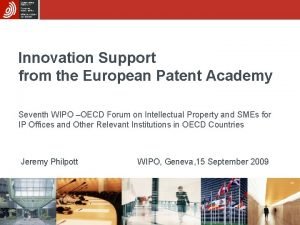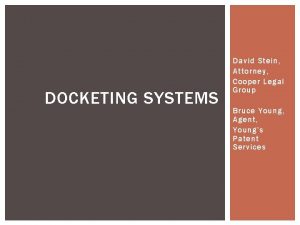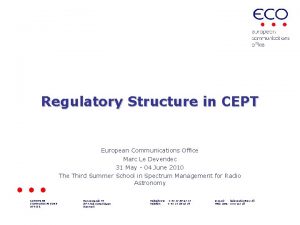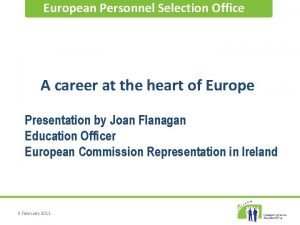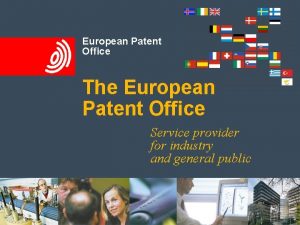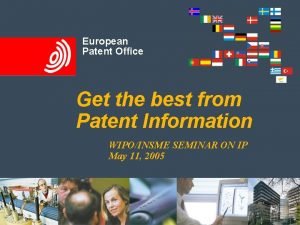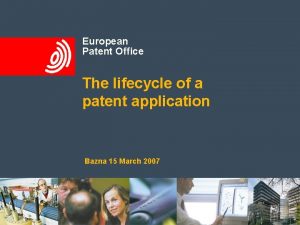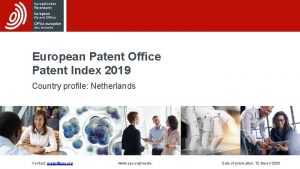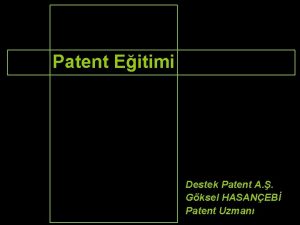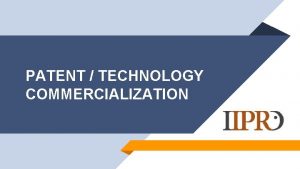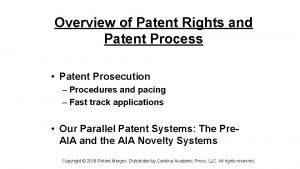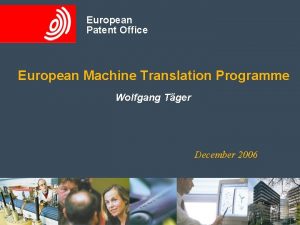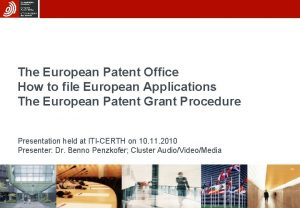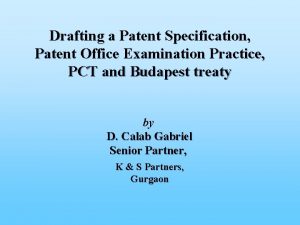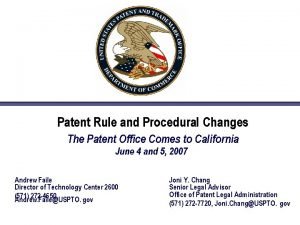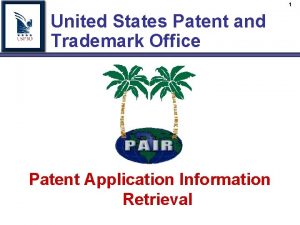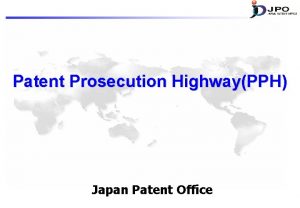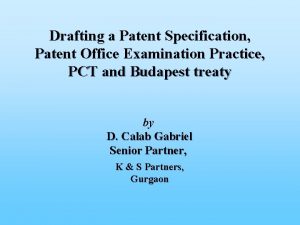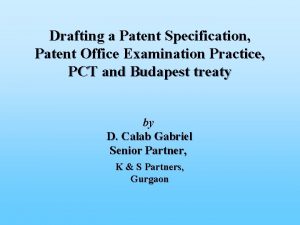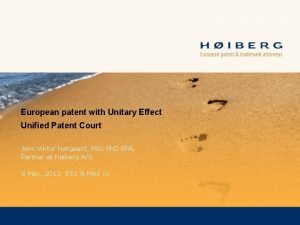European Patent Office The European Patent System serving























- Slides: 23

European Patent Office The European Patent System serving innovation Paul Schwander EPO, The Hague

Roadmap • History • Practical issues • Facts and figures • Conclusion 2

Patent law: striving for harmonisation An invention is universal 3

Paris Convention 1883 Before: simultaneous filings After 1883 12 Months 4

A bit of history: a European idea • 1958 Treaty of Rome • 1960 Idea of a European Patent • 1968 Splitted into 2 projects: a European Convention – the Community Patent • 1973 Convention signed • 1977 European Patent Office 5

Example of an international patent procedure when the EPO did not exist 6

The Patent filed in 1975 SYSTEMS FOR STORING AND TRANSFERRING DATA 7

First filing followed by geographic extensions 8

The Smart Card Patent procedure National patents 12 months Priority 9

The European Patent System (National & European) or European Direct Priority period Common grant procedure National Patents 10

Grant procedure: Search and Examination EP 822788 Drug Release Coated Stent A stent for implantation in a body comprising a tubular metal body (10) having open ends and an open lattice sidewall structure and a layer on the surface of said sidewall structure, said layer comprising a hydrophobic elastomeric material incorporating an amount of biologically active material therein for timed delivery therefrom. 11

Prior art search: closest prior art documents WO 9112779 A prosthesis for insertion into a lumen to limit restenosis of the lumen. The prosthesis carries restenosis-limiting drugs which elute after the device is positioned in the lumen. 12

Examination 13

Granted patent vs. Application 1. A stent for implantation in a body comprising a tubular metal body (10) having open ends and an open lattice sidewall structure and a layer on the surface of said sidewall structure, said layer comprising a hydrophobic elastomeric material incorporating an amount of biologically active material therein for timed delivery therefrom. 14

What advantages does a European patent have? Unitary protection standards in the contracting states • One application/one language • “A la carte” market by designation of countries Cost-effective • Costs less than 3 separate national patents Strong • Thorough search – 50 million documents • Substantive examination = sound legal protection 15

Average costs: EP Patent 8 countries 10 years Patent Office 4 300 € 14% Attorney 6 100 € 20% Renewal fees 8 900 € 28% Translation 11 800 € 38% Total 31 100 € 8. 5 € day 100% 16

Facts and Figures • • In 2004: 178 000 filings 6 000 staff members – 3 500 examiners Munich-The Hague-Berlin-Vienna-Brussels 55 million patent documents in its database 17

Applicant’s origin 18

The European patent system European Patent Organisation: Member States 19

The European Patent Organisation European Administrative Patent Office Council The executive body The legislative body The Office's task is to grant European patents. Important functions: • to adopt the budget • to approve the President´s actions in implementing the budget • to amend the Implementing Regulations and Rules relating to Fees The Administrative Council consists of delegates from the member states. 20

EPO and PCT • Different: Granted Patent vs. Common file • Linked: EPO can be an International Searching Authority and an International Preliminary Examining Authority • If you want to delay decisions on geographic coverage: PCT usually preferred. 21

To conclude • A unexpected success: 5 times more applications than initially expected • A continuous harmonisation process • An application of the subsidiarity principle 22

European Patent Office Thank you for your attention • www. european-patent-office. org Paul Schwander EPO, The Hague 11 May 2005
 European patent academy
European patent academy Docketing systems
Docketing systems European communications office
European communications office Trainee european commission
Trainee european commission European personnel selection office
European personnel selection office Edpo gdpr
Edpo gdpr Hát kết hợp bộ gõ cơ thể
Hát kết hợp bộ gõ cơ thể Bổ thể
Bổ thể Tỉ lệ cơ thể trẻ em
Tỉ lệ cơ thể trẻ em Gấu đi như thế nào
Gấu đi như thế nào Glasgow thang điểm
Glasgow thang điểm Bài hát chúa yêu trần thế alleluia
Bài hát chúa yêu trần thế alleluia Kể tên các môn thể thao
Kể tên các môn thể thao Thế nào là hệ số cao nhất
Thế nào là hệ số cao nhất Các châu lục và đại dương trên thế giới
Các châu lục và đại dương trên thế giới Công thức tính thế năng
Công thức tính thế năng Trời xanh đây là của chúng ta thể thơ
Trời xanh đây là của chúng ta thể thơ Mật thư anh em như thể tay chân
Mật thư anh em như thể tay chân 101012 bằng
101012 bằng Phản ứng thế ankan
Phản ứng thế ankan Các châu lục và đại dương trên thế giới
Các châu lục và đại dương trên thế giới Thể thơ truyền thống
Thể thơ truyền thống Quá trình desamine hóa có thể tạo ra
Quá trình desamine hóa có thể tạo ra
